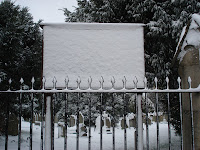
Predictably wonderful CME yesterday from super-hero
Canon David Hoyle whose excellence I've celebrated
before. When he preached at St M’s last autumn I made him cringe during my welcome by saying that I’d never yet heard him utter a disappointing word,- but I only said it because it’s true!
So, yesterday we had to do some serious thinking about an area that tends to be skirted round by the inclusive, liberal church in which I’d place myself at home.
SinWe were alerted to the contemporary tendency to see sin as just a species of psychological malaise. In pastoral encounters, I know I tend to speak about “brokenness” and “failure” rather than “sin”. Is this just because of a culture that equates sin with either the sex scandals of the tabloid press or an over-indulgence in chocolate (a la Slimming World, which apparently allows you up to 10 “sins”, - calorific, high point foods,- per day)? Or is it because I’m so embroiled by the outlook that celebrates self “Because I’m worth it”.
It’s a culture founded, in the final analysis, on the sin that inverts the proper order of creation, to make human beings the measure of all things, the centre of the universe.
If worship is an expression of the right order of things, then sin is its antithesis. Instead of God on the throne, there’s self…
Even as I try to speak of an alternative route, I’m held captive by the prevailing mind-set. I want to emphasise the overwhelming love of God, particularly in a context in which fear might seem to have been the foundation of worship for too long…but perhaps I do this at the expense of confronting the reality of my own sin.
Sin, we learned, is a mismatch, a disappointment of expectation, a negation of the selves that we should be in Christ.
It is a behavioural choice,- to select a lesser good above a greater, which will in its turn lead to a distortion of other relationships, so that everything becomes disordered, inappropriate. We are satisfied with a secondary treasure , and are gradually shaped by that choice, travelling ever further from the true selves we are called to be in Christ.
DH was terribly clear in his demonstration that sin is parasitic upon a corresponding virtue. Too often, this is what makes it seem attractive. Thus pride presents itself as humility. As we say “Lord, I am not worthy…” we are bidding for attention, placing ourselves centre-stage “ Look at me, being humble. Don’t I do it nicely?!”
“Once in a saintly passionI cried with desperate grief“O Lord, my heart is black with guiltOf sinners I am chief.Then stopped my guardian angelAnd whispered from behind“Vanity, my little manYou’re nothing of the kind” (from E.G.Rupp "Luther's Progress")
Avarice and gluttony both arise from a failure to trust in God’s provision…instead, we set about providing for ourselves, asserting our self-dependence rather than accepting that God will give us all we need and more than we can imagine
“It is God’s good pleasure to give us the Kingdom, but all we pray for is a holiday or a new car”
What’s more, we set out to acquire them, pursuing our goals relentlessly, till we are consumed by the process, the appetite, and lose ourselves utterly. DH quoted one example from
The Great Divorce, of a woman who has grumbled for so long that she has become nothing but a grumble…but I came home thinking of another scene from the same book,- the process by which the dwarf (the true self) is swallowed gradually by the posturing Tragedian …
I wondered, as I drove home, whether in fact all sins are derivatives of pride, since they seem ultimately to involve putting our own kingdom, our own fulfillment in the place of God. David ended the afternoon by pointing out that when we are called to life in all its fulness, that is not to the apotheosis of Kathryn-ness, but to a Kathryn who is fully human
in Christ.
(Michael at
feig-city has also posted about the day...David is
so good at making us think)
























